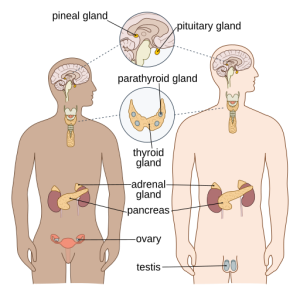Have you ever felt off-colour and explained it away as “oh, it’s just my hormones”?
Hormone fluctuations are linked with a whole range of health experiences.
But while hormone levels do naturally vary over time, significant disruption in hormones can be very serious, even deadly.
CALHN’s Dr Brigette Clarke and Clinical Associate Professor Sunita de Sousa are finding new solutions for patients who experience ill health related to hormones.
Their recent research focuses on two important hormone-producing organs: the adrenal glands (found on top of the kidneys, in the abdomen) and the pituitary gland (located in the brain).

Hormones are active all over the body
Hormones are natural chemicals that coordinate biological functions such as growth, metabolism and sexual development.
Produced by glands, hormones travel via the bloodstream to act on many different types of tissues.
For example, adrenaline produced by the adrenal glands leads to the classic ‘fight or flight’ response, including increased heart rate and more efficient lung function.
Cortisol produced by the adrenal glands helps regulate your body’s response to stress.
Growth hormone produced by the pituitary gland results in growth of muscles and bone.
The field of medicine that focuses on hormones is known as endocrinology.
Treatment of hormone insufficiency
Dr Brigette Clarke is Endocrine Research Fellow at The Queen Elizabeth Hospital. A large portion of her work focuses on a condition called adrenal insufficiency.
“Adrenal insufficiency results from insufficient production of the normal adrenal hormones, particularly cortisol,” says Brigette.
Adrenal insufficiency is most commonly due to autoimmune disease or an inherited genetic condition.
“Adrenal insufficiency is fatal is left untreated, so patients are provided with medication to replace the affected adrenal hormones, including cortisol,” Brigette says.
“However, affected individuals have poorer health outcomes than the general population, and hormone replacement can be particularly challenging for patients to manage during illness and other stress.”
“The standard approach to treatment has remained largely unchanged over the last 70 years,” says Brigette.

Dr Brigette Clarke is Endocrine Research Fellow at The Queen Elizabeth Hospital.
Brigette’s PhD research explored cell therapy to deliver cortisol in a way that more closely mimics the ebbs and flows of its natural production.
Her approach is an extension of transplant science pioneered for use in diabetes patients at the Royal Adelaide Hospital, utilising a locally-developed biomaterial originally created for the treatment of burns.
“We developed a new pre-clinical model for adrenal cell transplantation,” Brigette says.
“The work represents an exciting proof of principle for the technique, and has helped identify a number of focus areas to progress cell therapy as a treatment option for adrenal insufficiency.”
This work was a collaborative project across CALHN, the University of Adelaide and SAHMRI.
Pituitary: the master gland
Clinical Associate Professor Sunita de Sousa is a Senior Staff Specialist in endocrinology and genetics at the Royal Adelaide Hospital, with a particular interest in tumours of the pituitary gland.
“We refer to the pituitary as the ‘master gland’ due to its vital role in producing hormones that control other glands and many processes in our body,” Sunita says.
The thyroid, ovaries, testicles, and the adrenal glands are all regulated by hormones originating in the pituitary gland.
“In turn, these glands are vital for keeping our bodily functions on an even keel, including appetite and metabolism, stress responses and reproduction,” says Sunita.
“That’s why a problem with the pituitary gland can create such wide-ranging health impacts.”
“It’s also why pituitary tumours can be challenging to identify and treat.”
Tumours of the pituitary affect one in every 1000 Australians.
“Hormonal effects of pituitary tumours include infertility, abnormal breast milk production, unusually short or tall stature, and a disease called Cushing’s syndrome which can be fatal if left untreated,” Sunita says.
“Neurological symptoms such as vision loss can also occur, due to the position of the pituitary gland immediately beneath the brain.”

Clinical Associate Professor Sunita de Sousa is Senior Staff Specialist at the Royal Adelaide Hospital.
Sunita’s recent research looked at novel genetic factors that may be involved in pituitary tumours.
“Our research focused on a particular gene which is known to predispose breast cancer when mutated,” Sunita says.
“For the first time, we have linked this same gene with pituitary tumours.”
Variants of the gene do not guarantee somebody will develop a tumour. But they are a key piece in the puzzle of understanding why some people develop pituitary tumours and others do not.
“In the future, this sort of information could help us develop better screening and monitoring programs for pituitary tumours,” Sunita says.
This work was a collaborative project across CALHN, the University of Adelaide, SA Pathology and other institutions.
Through her role in leading the SA Pituitary Research Group Sunita is also involved in research to develop innovative imaging technologies so doctors can better identify tumours of the pituitary gland.
Read the research
Both Bridgette and Sunita’s research papers were highlighted in Endocrine News as among the most impressive breakthroughs and remarkable advances in endocrine science and research in 2024.
Brigette’s research on adrenal cell transplantation was published in the journal Endocrinology: In Vivo Formation of Adrenal Organoids in a Novel Porcine Model of Adrenocortical Cell Transplantation
Sunita’s research on pituitary tumour genes was published in The Journal of Clinical Endocrinology and Metabolism: Increased Prevalence of Germline Pathogenic CHEK2 Variants in Individuals With Pituitary Adenomas
Lead image thanks to UnSplash



